Supply Chain
Tech Upgrade: Blockchain Technology for Logistics
July 12, 2022 • 338 Views • 17 min read
Bohdan Vasylkiv
CEO & Co-Founder
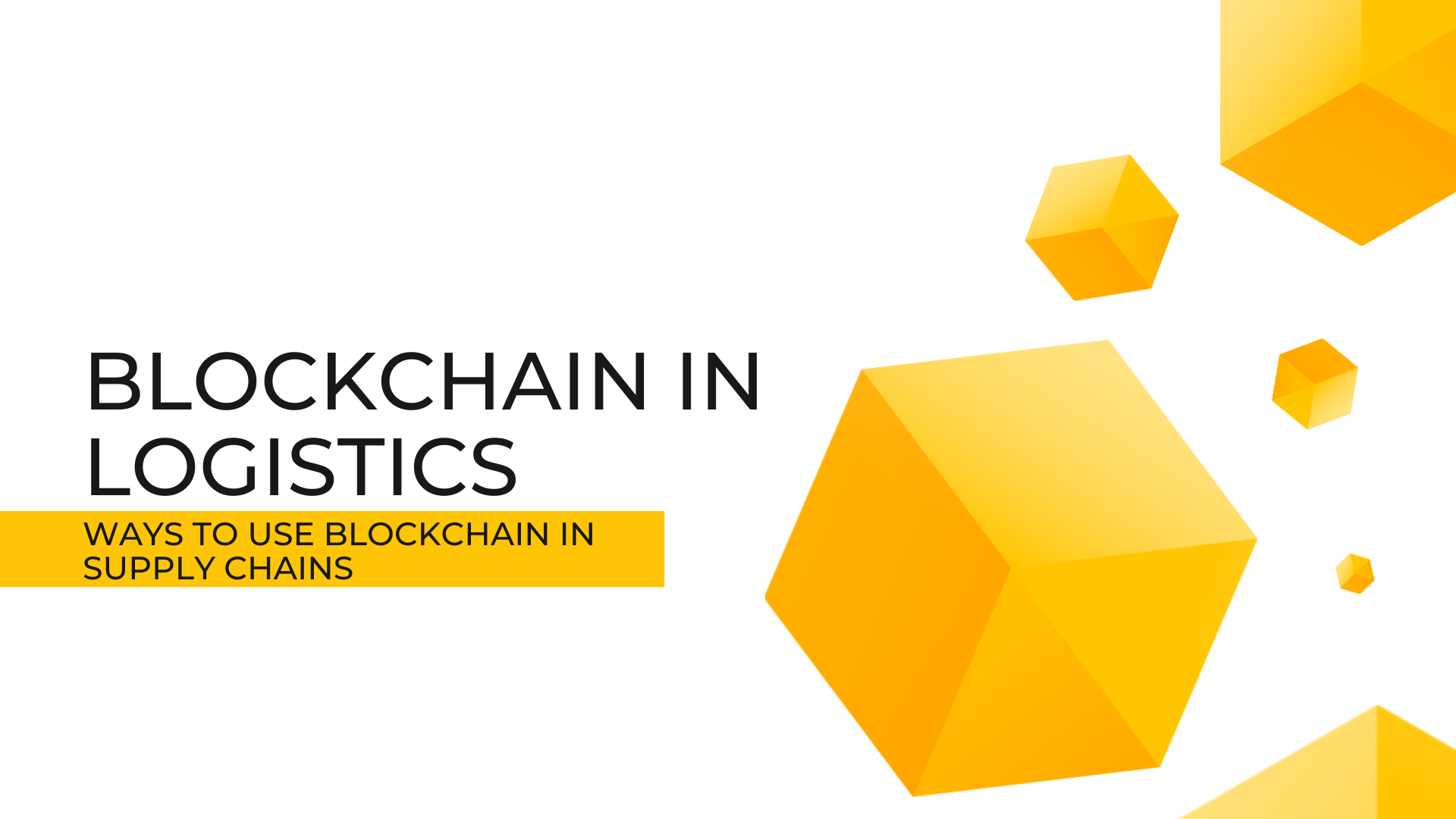
Blockchain technology is becoming a common everyday term. Recently, developers have paid attention to blockchain technology after the growth of the cryptocurrency market. As a matter of fact, it can be used for numerous purposes and industries, that can even have no connection to its origins. Actually, blockchain structure is more of a distributed digital ledger technology type. And it can change the financial sector with its innovative methods.
However, one more possible industry for blockchain adoption is Logistics. Of course, there are plenty of other spheres, where the blockchain can be used. Nevertheless, Blockchain in the Supply Chain industry is possibly one of the best development trends in the latest years. Moreover, they are related to each other.
Actually, Blockchain can be considered as one of the full-fledged supply chain processes. The main aspect, that differentiates it from the regular supply chains is the product it supplies. Clearly, when we hear “supply chain” we probably imagine lorries, conveyors, and a lot of boxes. Nevertheless, material objects and the delivery process are not the only part of the supply chain.
Eventually, data is one of the most essential components for logistics companies. In order to make a delivery, you have to know what to deliver, where to do it, how much time will it take, and the quantity of the needed goods. Additionally, you want this information to be accurate and secured, with the possibility to track all the changes in the status of the delivery. In fact, it is the main response of supply chain managers.
What Is Blockchain?
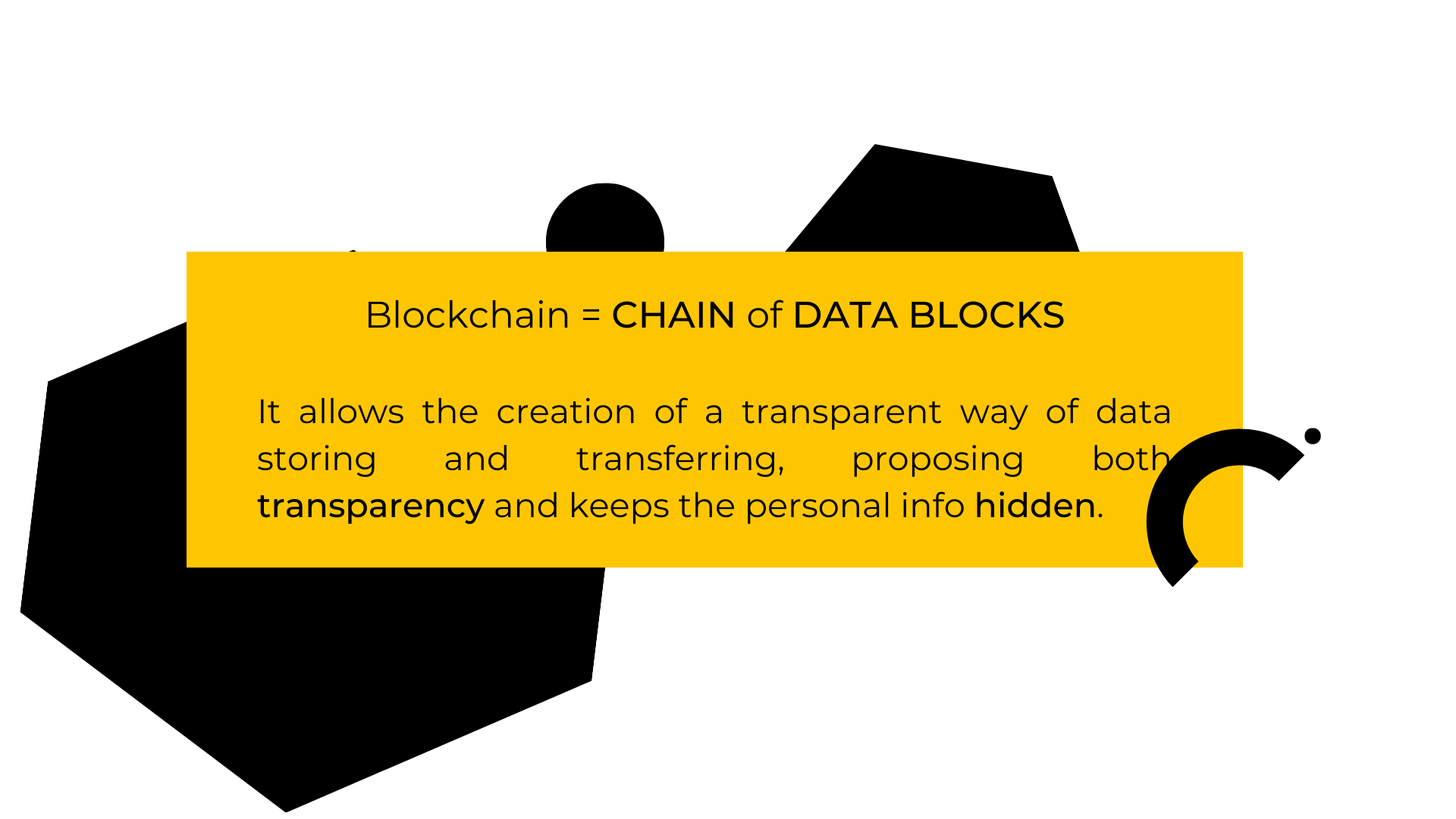
In simple words, this term stands for “Block” and “chain”. In fact, it is a method to store and transfer information in a secure digital way. It consists of interconnected data blocks. Each block has its own capacity, and when it is full, the next block is formed and connected to the chain. Moreover, each block interacts with the previous one, and each action is approved or declined by the chain. As a result, making any unauthorized changes like editing or deleting the block is almost impossible.
Moreover, the blockchain is a decentralized structure, i.e. there is no such thing as a central authority. It means that the data is stored in more than one place. As a result, blockchain solutions can easily cope with various issues such as external intervention, problems with electricity or the Internet, etc., improving overall data security. It is why it is more reliable and safer than regular databases and can significantly improve supply chain transparency.
Even though originally it is a FinTech, designed for financial transactions, the variety of industries where it can be used, as well as the usage purposes are increasing day by day. Safety, decentralization, and almost full autonomy - all these features are a great addition to any possible industry, that works with large flows of information.
The Advantages of Blockchain
With companies such as Walmart and Procter & Gamble leading supply chains in the early 90s, significant advances have occurred in the use of ERP systems. But visibility can still pose challenges to large supply chains that involve complex transactions. The limitations and opportunities for a future blockchain world should also illustrate a hypothetical scenario involving retailers who purchase products from a supplier.
Blockchain Technology For Logistics Industry
Actually, there are a lot of possible usage purposes of the blockchain in logistics operations. It can become a powerful instrument, that can change some aspects of the sphere and improve the overall conditions of some supply logistics processes. To tell the truth, it is already happening: there are some examples of using blockchain in logistics. So, how can it change the shipping industry?
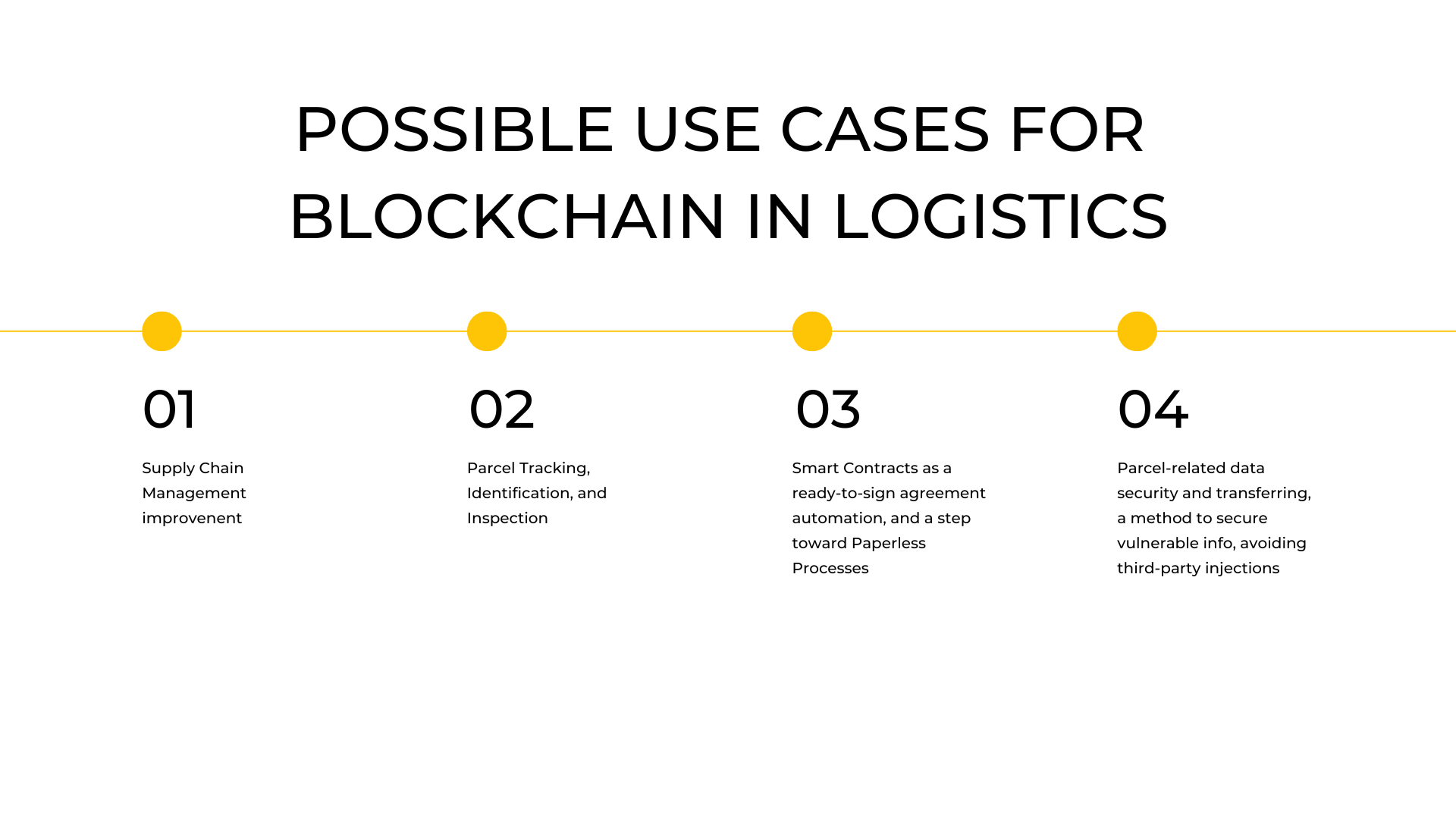
Supply Chain Management Software Improvement
First of all, blockchain technology adoption is a great addition to the TMS software. Transportation Management System is among the most essential components of the Logistics sphere. Clearly, it is used to manage all the related supply chain processes. Manual processes like communication with the freight forwarders and trucking companies, parcel tracking, freight shipping status, shippers database, or even order management - all of these features, that have already become a part of the must-have list, are often implemented into the TMS software.
Clearly, in this case, blockchain technology can be used as an information-transmitting method between parties involved via the TMS software. It will improve the security of the data, as well as allow monitoring of all changes and tracking them down faster and easier.
Supply Chain Data Inspection
Apparently, the opportunity to track shipments is a very important feature. Obviously, if something happens to the product - it probably happens during transportation. Therefore, parcel tracking is helping to manage all supply chain processes and figure out if something is wrong.
Read also: 5 Ideas To Build A Marketable Supply Chain Software
Of course, blockchain won’t be implemented into all the goods. Nevertheless, various trackers and beacons, which are working based on the blockchain, can revolutionize logistics, order management, and freight shipping. For instance, each of the shipping companies has a special process to perform each time the container is being opened or closed - to seal it.
Nevertheless, most modern seals are old-fashioned tags, that can be easily forged. At the same time, if they are built on the standards of blockchain technology, they will provide secure transportation options, because they can’t be faked. For instance, they can provide information directly from the shippers along the way.
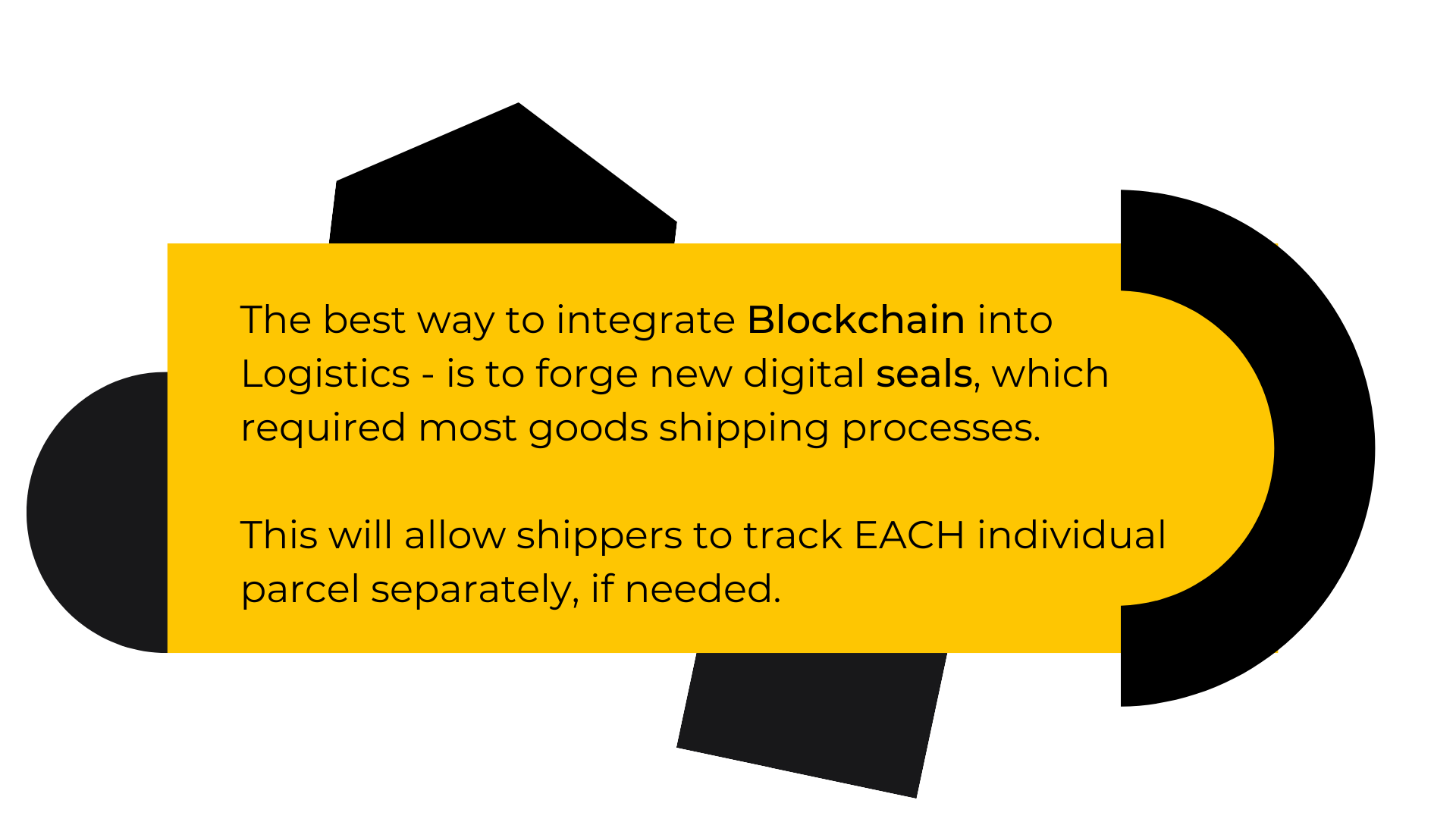
Also, blockchain can be used by freight forwarders and other providers at various checkpoints and warehouses. Therefore, each of the local shippers or retailers can easily report the number of received goods and the system can automatically count if the number is correct. Moreover, even if the system will make a mistake in calculations(it won’t), it would be easier to find the moment where the mistake was made.
Supply Chain Transparency and Traceability
As blockchain technology is distributed, data on supply chains is accessible to all parties in the supply chain. These data include details on the supply chain, the destination, and the origin of the products. As a matter of fact, each parcel or any other element on the supply chain has its IDs and accompanying information. Thus, it is possible to assume, that such info can be stored and shared via the blockchain network.
This technology can be used to track goods transported from the supply chain, enabling better coordination and communications among all participants within the supply chain. It is also useful for identifying problem areas and tracking the origin and quantity.
Blockchain Based Smart Contracts
Eventually, these are one of the most innovative things possible thanks to the benefits of blockchain technology. In simple words, smart contracts are contracts, where the machine makes the last decision. Obviously, they are based on the blockchain. So, first of all, they are encrypted and secure. Moreover, there are no third parties included, meaning that no additional charge or inspection is needed.
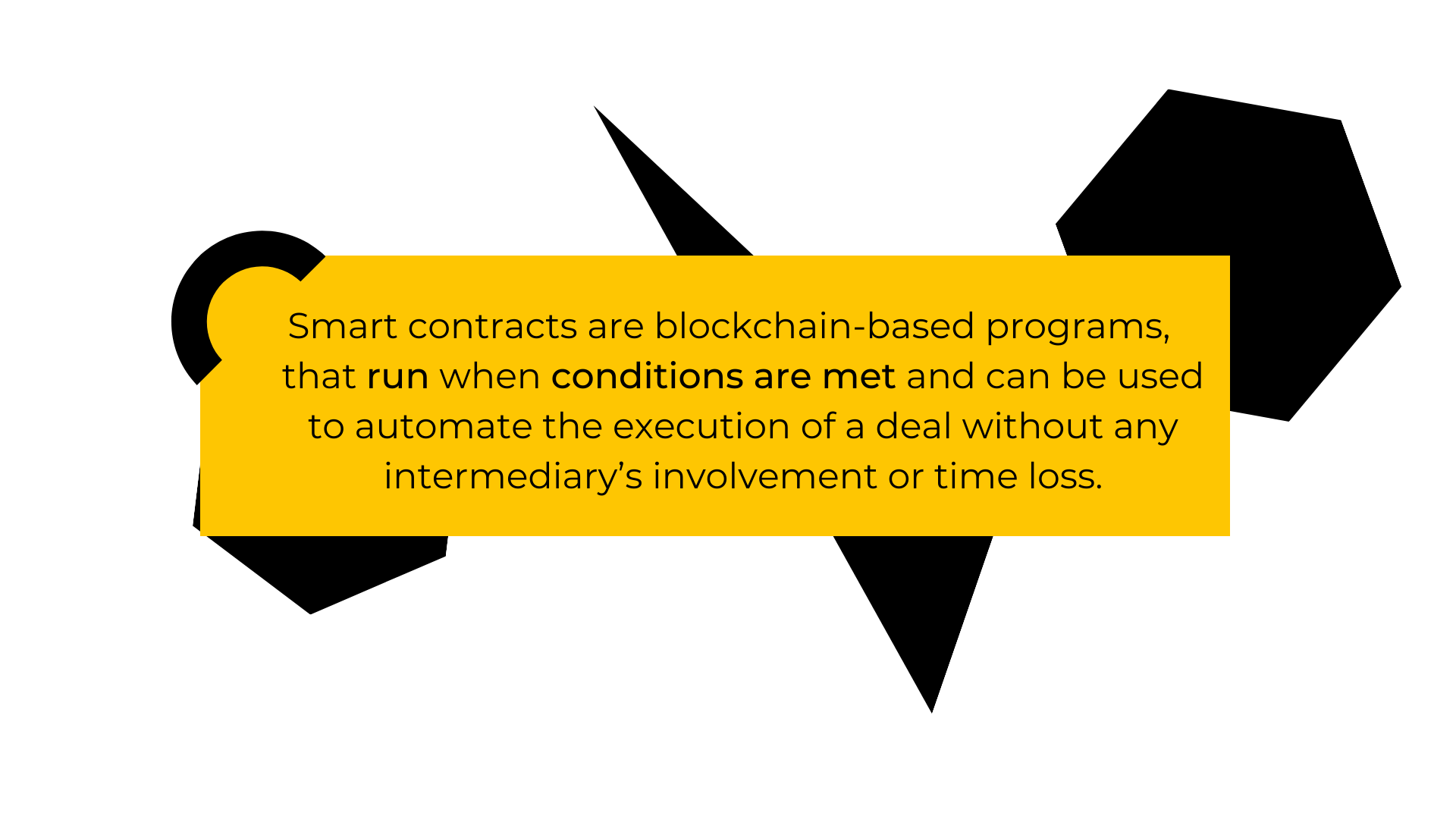
But the most important is that these contracts are operated with the machine. As a result, it is almost impossible to make any mistakes - the algorithm will not allow it. Furthermore, it allows self-execution. Because all the major processes are monitored by a program, it can execute the contract as soon as both sides meet the conditions. As a result, the contacts can be executed almost immediately and all the foregoing processes like transferring money can be done as fast as possible. All the needed reports and papers can be done too.
Subsequently, we can speed up and automatize almost the full cycle of the logistic process. A great addition to the smart contracts feature is the paperless opportunities.
Paperless Processes
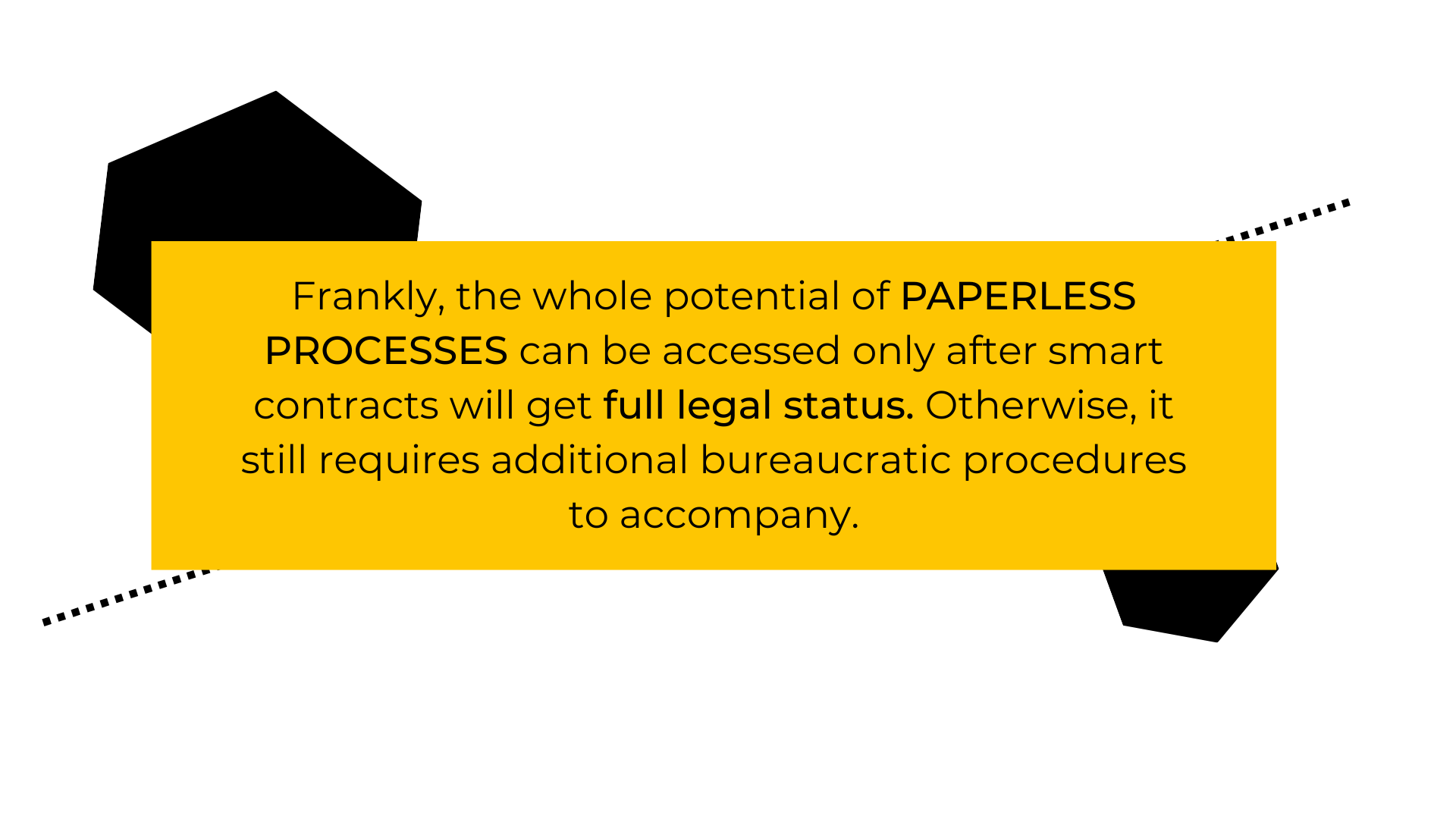
According to the fact, that blockchain is a digital technology, used for transmitting data, we can assume that it can help decrease the number of bureaucratic procedures as well as papers needed.
For instance, as was mentioned before, at the moment all the logistics providers are obligated to carry tags as well as to seal the containers each time the inspection is done. Obviously, the same situation is taking place with the bureaucracy and papers. So, freight forwarders have to carry lots of various papers like documents, permissions, passes, etc.
Nevertheless, all of them can be bypassed simply by using blockchain. As a result, all needed information can be written down and attached to each parcel and updated if needed. However, it has to become a common practice before becoming possible. Because the freight forwarders are not the only ones who have to deal with all the paperwork, authorities are involved in it as well. So, at first, it can exist as an alternative or addition to the actual papers. And yet, papers that are required only by companies can be easily transferred into the digital world.
Additionally, the paperless format significantly simplifies and speeds up the whole logistics process, which is related to documentation. At the moment, most of them are checked and signed in person. As a result, it takes some delivery time for the paper to reach the checkpoint and back. On the other hand, a paperless format enables the immediate online data entry, signing, and sharing of these docs.
Additional Bonuses
These are not big enough to be put into separate categories. Nonetheless, they are worth mentioning.
No Third-parties
First of all, there is no third-parties access. As a result, all the information can be reached only by authorized persons. In addition to the security advantages, it also provides practical ones like bypassing additional expenses, etc.
Data Transparency
It is among the most noticeable and common key benefits of blockchain technology. As was mentioned before, each change or mistake, as well as any other bit of information can be easily traced back due to the type of system’s architecture. Additionally, it helps to increase traceability of each package, allowing to track products, analyze detailed record for each of them, and better plan logistics. For instance, it is possible to create faster routes, decreasing delivery time.
Reliability and safety
Thanks to the decentralization, it is hard to imagine the conditions, when the whole structure can be disabled or compromised.
Creating a Workable Technology
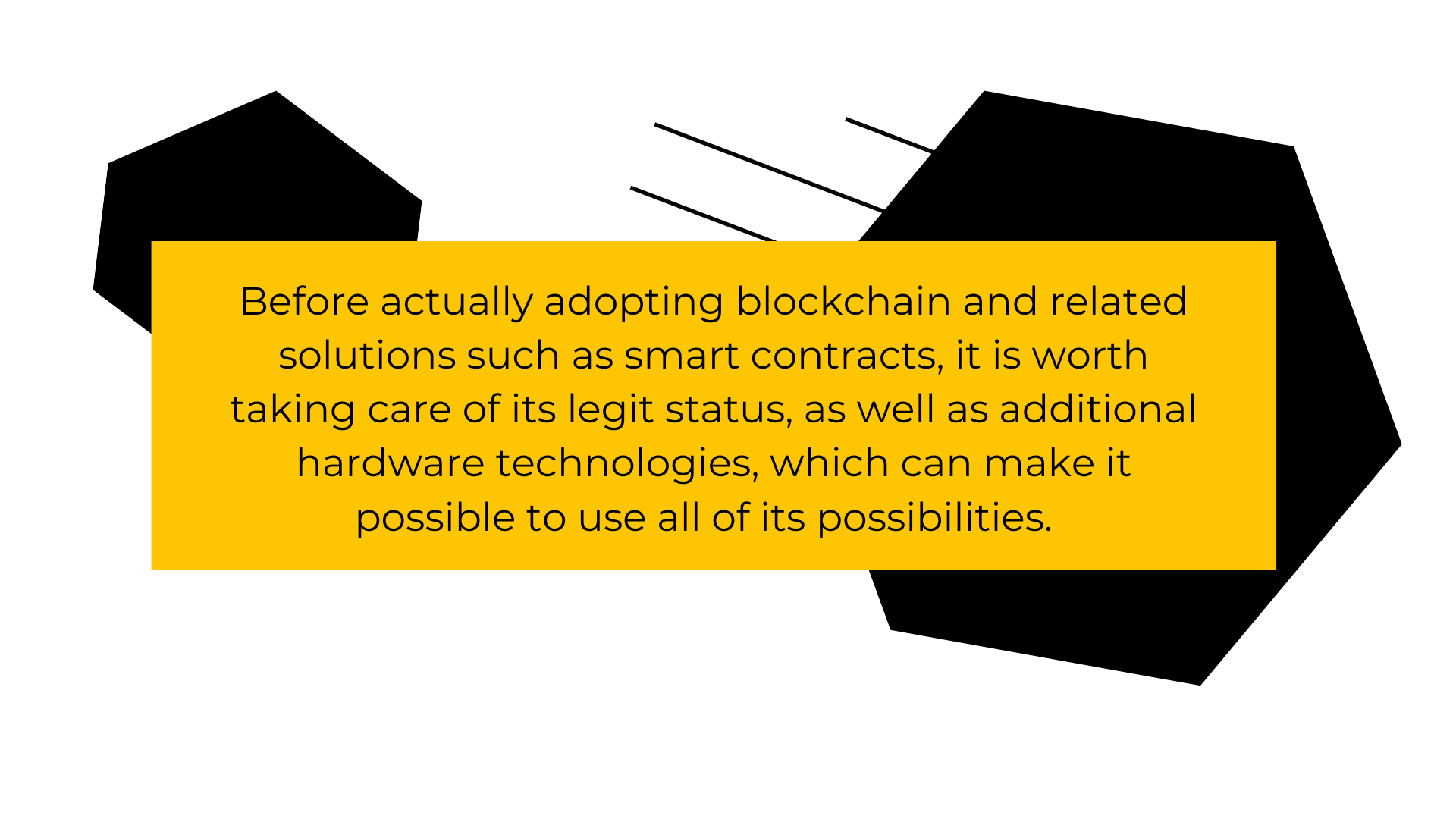
Additionally, it is worth talking about the specifics of the blockchain in logistics.
It is clear, that blockchain in supply chain management will need new rules because the demand in the supply chain differs in important ways from that of cryptocurrency networks.
Bitcoin blockchains are amazing system that simultaneously meets various objectives. The system is remarkably secure and irrevocably recordable on transactions, reduces the double-spend, and provides evidence for the ownership of digital coins. And this does so without reliance on centralized authority and allows users to remain anonymous while entering the network.
Alternatively, as was mentioned before, there are no regulations or laws, which give such technologies a legit status. So, for instance, creating a smart contract is a difficult task even today, requiring duplicating the same terms and agreements in a more traditional way. Also, it is preferable to improve and adjust various hardware solutions, like seals, which can be switched to digital nature.
Eventually, there are numerous steps to take, before claiming that blockchain in logistics is a ready-to-use solution. Yet, the number of possible use cases is surprisingly large, and such implementation will definitely change global trade for good.
End Line
Summing up all the above, we can conclude that there are obvious advantages of blockchain for supply chains. It helps to deal with common issues of the industry such as freight shipping tracking, improving order management, integration into various supply chain management systems, etc.
At the moment, there are some examples of successful integration of blockchain technology into the Logistics industry. Nevertheless, it is still considered a testing sample, meaning that there is a lot to do and test before stating that this technology can be easily implemented into Logistics.

Nevertheless, we strongly believe that it is the technology of the future and it is worth developing and implementing as soon as possible. If you are considering it and looking for skilled developers - just contact us and we will do the rest.
What’s your impression after reading this?
Love it!
1
Valuable
1
Exciting
1
Unsatisfied
1
FAQ
Let us address your doubts and clarify key points from the article for better understanding.
YOU MAY ALSO LIKE
Let’s talk!
This site uses cookies to improve your user experience. Read our Privacy Policy
Accept
Share this article